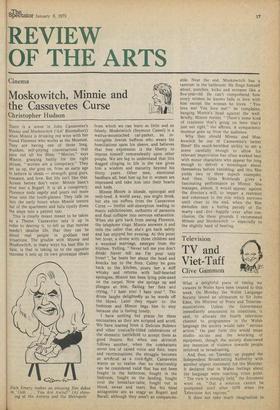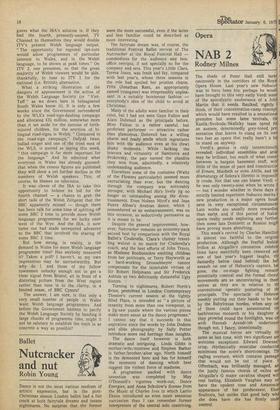Television
TV and Viet-Taff
Clive Gammon
What a delightful piece of timing we viewers in Wales have been treated to this week. On Monday the Welsh Language Society issued an ultimatum to Sir John Eden, the Minister of Posts and Telecommunications. Unless the Government immediately announced its intentions, it said, to allocate the fourth television channel to programmes in the Welsh language the society would take " serious action." On past form this would mean studio sit-ins and the wrecking of equipment, though the society disavowed any intention of violence towards people involved in broadcasting. And then, on Tuesday, up popped the Independent Broadcasting Authority with another urgent statement for the Minister. It declared that in Wales feelings about the language were reaching crisis point. "The view is strongly held," the document went on, "that a solution cannot be postponed until after 1976 when the Television Act expires."' It does not take much imagination to guess what the IBA's solution is. If they had the fourth, presently-unused, TV Channel to themselves they would double ITV's present Welsh language output. " The opportunity for regional opt-outs would allow programmes of particular interest to Wales, and in the Welsh language, to be shown at peak times." On ITV 2, one presumes, so that the great majority of Welsh viewers would be able, thankfully, to tune to ITV 1 for the national (i.e. British) alternative.
What a striking illustration of the dangers of appeasement is the action of the Welsh Language Society (or " Viet Taff " as we down here in beleaguered South Wales know it). It is only a few weeks since the Government surrendered to the WLS's road-sign-daubing campaign and allocated Mi million, somewhat more than it set aside for the succour of birthinjured children, for the erection of bilingual road-signs in Welsh. "Compared to the road-sign campaign," Dafydd Iwan, ballad singer and one of the front men of the WLS, is quoted as haying this week, "this campaign is far more important for the language." And he admitted what everyone in Wales has already guessed: that when the census figures are published they will show a yet further decline in the numbers of Welsh speakers. This, of course, he blames on television.
It was clever of the IBA to take this opportunity to bolster its bid for the fourth channel — a chance to grab the shirt tails of the Welsh Zeitgeist that the BBC apparently missed — though there has been talk for some time of splitting off some BBC 2 time to provide more Welsh language programmes for we lucky ones west of the Wye. And the IBA, it now turns out had made unrequited advances to the BBC that involved the sharing of some BBC 2 time.
But how strong, in reality, is the demand in Wales for more Welsh language programme time? Has anybody measured it? Taken a poll? I haven't, so my own impressions may be untrustworthy. But why do I, and, those of my fellow townsmen unlucky enough not to get a clear signal from Bristol, sit in front of a distorted picture from the West region rather than tune in to the clarity, in a limited sense, of BBC Cymru?
The answer, I am sure, is that only a very small number of people in Wales want Welsh language programmes. And before the Government hastens to pacify the Welsh Language Society by handing it large chunks of programme time, might it not be salutary to establish the truth in as concrete a way as possible?


































 Previous page
Previous page